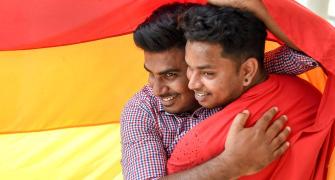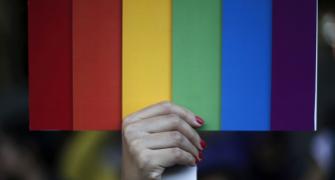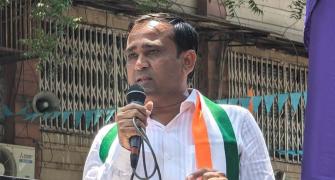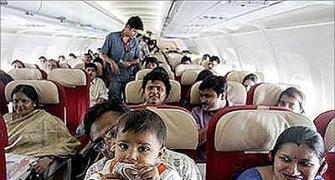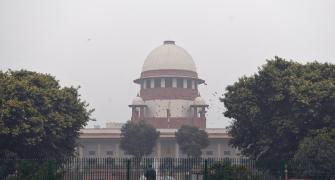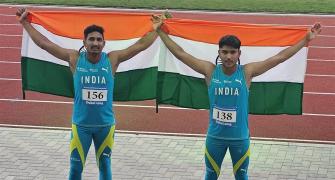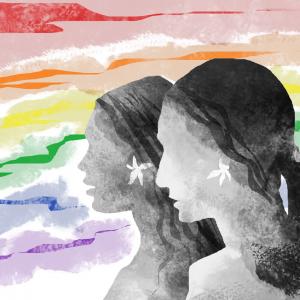Non-heterosexual forms of marriages or unions between individuals though not recognised are not unlawful, the Centre has told the Supreme Court.
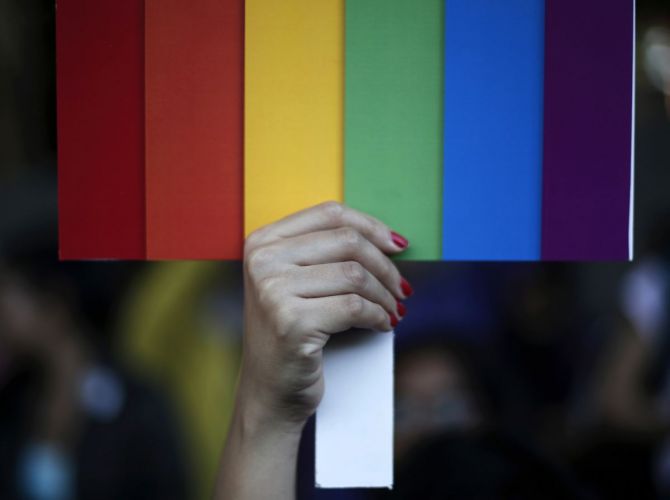
In an affidavit opposing a batch of pleas seeking legal validation of same-sex marriage, the government said the fundamental right to life and liberty cannot include any implicit approval of same-sex marriage.
The government said that at this stage it is necessary to recognise that while there may be various other forms of marriages or unions or personal understandings of relationships between individuals in a society, the State limits the recognition to the heterosexual form.
'The State does not recognise these other forms of marriages or unions or personal understandings of relationships between individuals in a society but the same are not unlawful,' it said.
The Supreme Court is scheduled to hear the matter on Monday.
The Centre said that a special status which is granted to heterosexual marriage cannot be construed as a discrimination against same-sex couples under Article 15(1) of the Constitution or as a privileging of heterosexuality.
This is because no other forms of cohabitation, including heterosexual live-in relationships, enjoys the same status as heterosexual marriage.
'Thus, it can be clearly seen that not every heterosexual union has a status at par with marriage. To fall foul of Article 15(1), there should be discrimination only on the basis of sex. It is evident that this condition precedent is not at all satisfied in the present case. Article 15 is therefore inapplicable and cannot be used to assail the concerned statutory provisions,' it said.
The Centre also said that the fundamental right under Article 21 is subject to the procedure established by law and the same cannot be expanded to include the fundamental right for a same-sex marriage to be recognised under the laws of the country which in fact mandate the contrary.
'It is submitted at that there can be no fundamental right for recognition of a particular form of social relationship. While it is certainly true that all citizens have a right to association under Article 19, there is no concomitant right that such associations must necessarily be granted legal recognition by the State. Nor can the right to life and liberty under Article 21 be read to include within it any implicit approval of same sex marriage,' the government said.
It added that following a Supreme Court verdict in 2018, the only change is that persons of the same sex can engage in consensual sexual intercourse without being held criminally liable under Section 377 of the Indian Penal Code.
'This, and no more than this, is what has been held in that case. While the aforesaid conduct has been decriminalised, it has by no means been legitimised. In fact, the reading of Article 21 in (the 2018 verdict) expressly does not include marriage, as seen from the cited extract,' it said.
Referring to the 2018 verdict, the government said that the dictum of it does not extend the right to privacy to include a fundamental right in the nature of a right to marry by two individuals of the same gender in contravention of prevailing statutory laws.
It said the observations in the 2018 verdict cannot be treated as conferring a fundamental right of being recognised in a marriage under Indian personal laws whether codified or otherwise.
'It is submitted that even if such right is claimed under Article 21, such right can be curtailed by competent legislature on permissible constitutional grounds including legitimate state interest. It is submitted that there cannot be an untrammelled right under Article 21 and cannot override other constitutional principles,' it said.
The Centre said that the principles of legitimate state interest as an exception to life and liberty under Article 21 would apply to the present case and the statutory recognition of marriage as a union between a 'man' and a 'woman' is intrinsically linked to the recognition of heterogeneous institution of marriage and the acceptance of the Indian society based upon its own cultural and societal values which are recognised by the competent legislature.
'In a same sex marriage, it is neither possible nor feasible to term one as 'husband' and the other as 'wife' in the context of legislative scheme of various statutes. Resultantly, the statutory scheme of many statutory enactments will become otiose,' it said.
The government said that the intent of the legislature was limited to the recognition of a legal relationship of marriage between a man and a woman, represented as a husband and wife.
Any other recognition over and above the conventional relationship of marriage between a man and woman would cause irreconcilable violence to the language of the statute.
The government said that if the prayer of the petitioners is recognised, it may lead to further anomalies in other enactments governing marriages of Christian and Muslim persons.
The Centre said that on a normative level, the society consists of smaller units of family, which in turn are predominantly organised in a heterogenous fashion.
'While other forms of unions may exist in the society which would not be unlawful, it is open for a society to give legal recognition of the form of union which a society considers to be quintessential building block for its existence,' it said.
The government said that in terms of Article 14 of the Constitution, same-sex relationships and heterosexual relationships are clearly distinct classes which cannot be treated identically.
'Hence, there is an intelligible differentia (normative basis) which distinguishes those within the classification (heterosexual couples) from those left out (same-sex couples),' it said.

